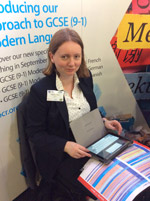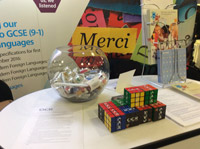Last week I took a trip to Newcastle with the OCR MFL team to Language World, the annual conference for the Association for Language Learning. We were there to talk to teachers about the reformed GCSEs in modern foreign languages, and present some of our research underpinning our approach to the reformed qualifications.
 On the first morning of the conference we assembled outside to watch the skies dim during the solar eclipse. This seemed rather symbolic, given the bleak headlines about the state of language learning in the UK: every week there are more headlines about falling uptake of modern foreign languages at secondary level and at university, with further concerns that language study will soon become restricted to students at independent schools.
On the first morning of the conference we assembled outside to watch the skies dim during the solar eclipse. This seemed rather symbolic, given the bleak headlines about the state of language learning in the UK: every week there are more headlines about falling uptake of modern foreign languages at secondary level and at university, with further concerns that language study will soon become restricted to students at independent schools.
At GCSE the situation is looking particularly depressing: teachers tell us that controlled assessment is dominating teaching time, and promoting memorisation rather than good language learning, leading students to switch off from language learning.
At GCSE the situation is looking particularly depressing"
However, just as the skies brightened after the eclipse, we soon all agreed that there is hope for language learning in our schools. In her plenary address, Bernadette Holmes set the tone for the conference, and admonished us not to talk about modern foreign languages. Today everybody has increasing access to materials and interactions in a wide variety of languages wherever they are, whether this is through online news sources, or by meeting and talking to people in multi-player games. Modern languages are just not as foreign as they once were.
The reformed GCSEs provide an opportunity to make the most of these innovations. The removal of controlled assessment will free up time for real language learning. This will be replaced by a focus on the use of authentic texts, such as blogs, chat room extracts or current affairs articles. Eva Lamb from King Edward VII School in Sheffield, argued convincingly that these changes will require a new type of language learner, who is resilient, emotionally intelligent, independent and cooperative.
...these changes will require a new type of language learner"
At OCR, our new modern (but not foreign!) language GCSEs will take a skills based approach, to encourage students to develop a set of transferable language learning skills, and help them to learn how to learn languages, at GCSE, and in the future. This approach will help students develop functional skills to become confident and independent language users.
 The increased focus on authentic texts will help teachers move away from the artificial and dull texts found in many GCSE textbooks, and read texts which can excite and motivate students. An early sight of some of the pieces in the OCR anthology for French has certainly made me want to revisit the French I learned at school.
The increased focus on authentic texts will help teachers move away from the artificial and dull texts found in many GCSE textbooks, and read texts which can excite and motivate students. An early sight of some of the pieces in the OCR anthology for French has certainly made me want to revisit the French I learned at school.
Some people have suggested that the reforms to GCSE courses are old fashioned, and look backwards rather than forwards. If we look at the skills identified as 21st Century Skills – the skills which people will need to thrive in an international, multicultural and inter-connected world, suddenly these reforms seem extremely modern. Modern language students at GCSE will develop their intercultural understanding and develop communication skills which can be transferred to their native language as well as any additional languages they learn.
Reading authentic texts will help students to develop strategies to extract information from written and spoken language, probably using ICT as they do so. They will learn how to learn, often in collaboration with others.
The skies do indeed seem to be brightening for the modern world of modern language study.
Frances Wilson
Principal Researcher, Oxford, Cambridge and RSA (OCR)
Related materials